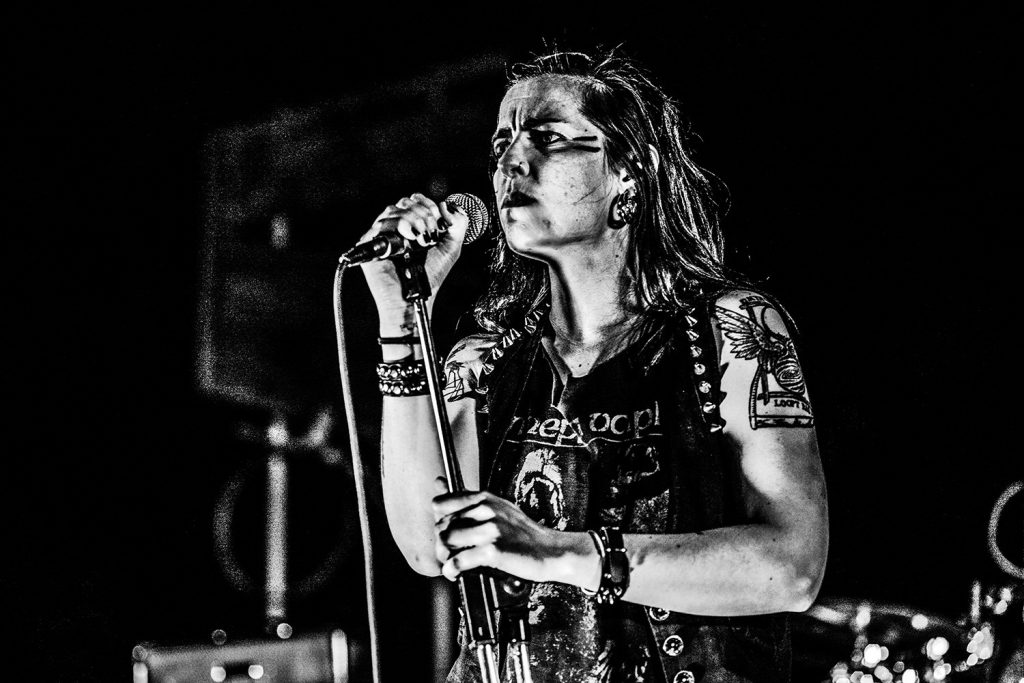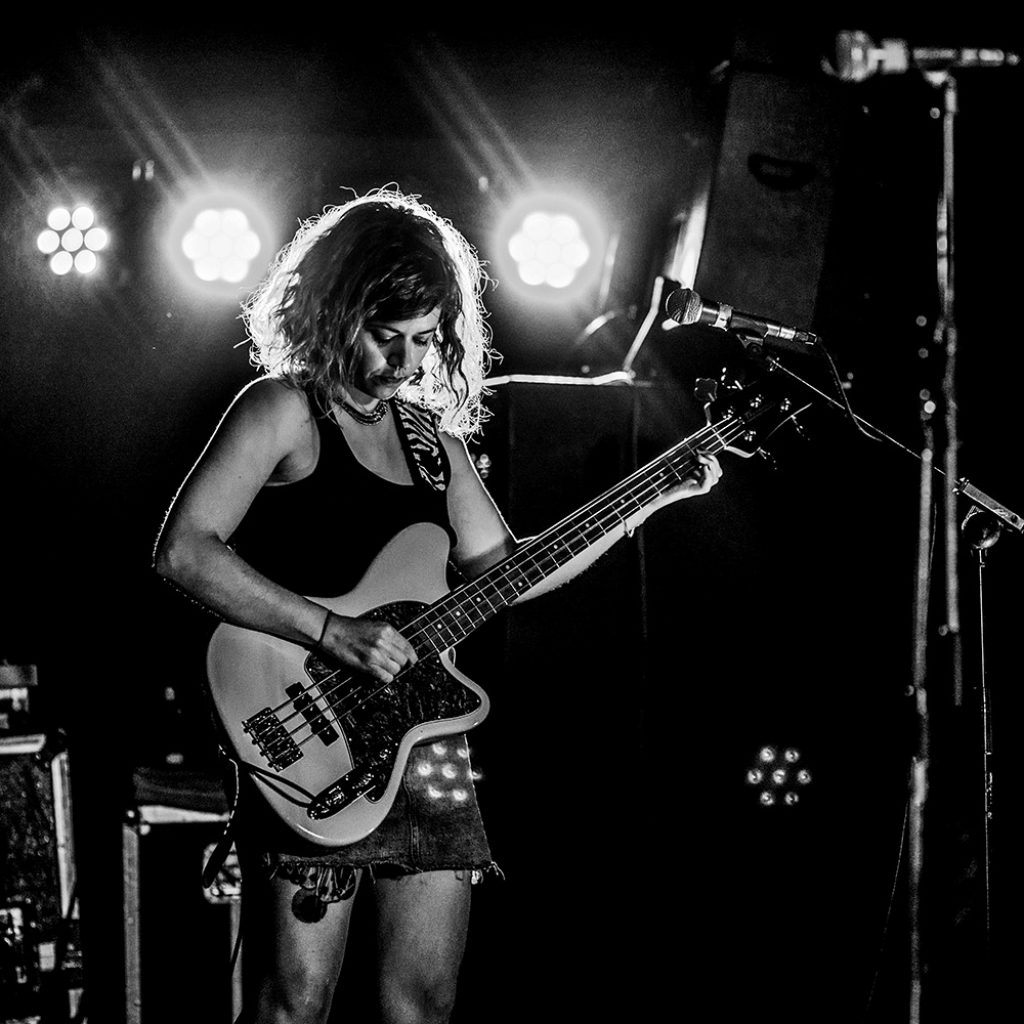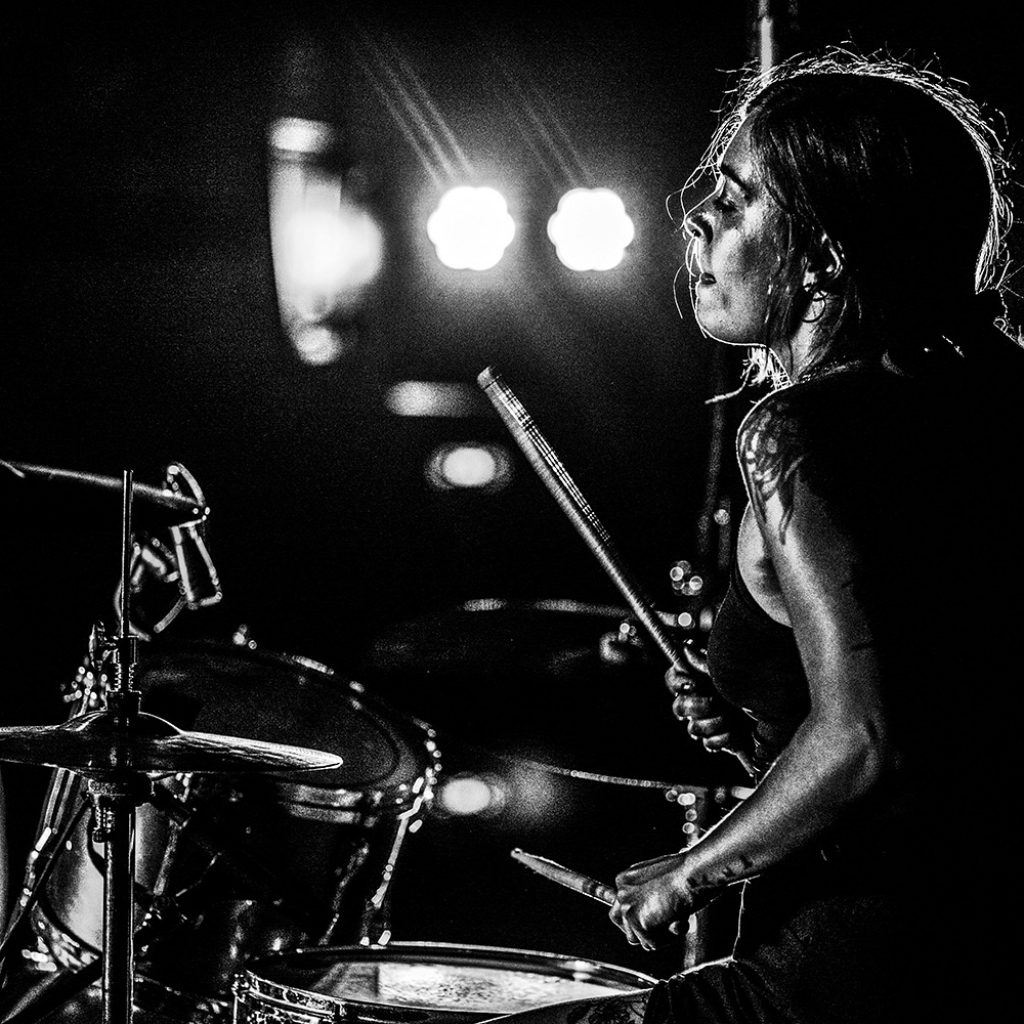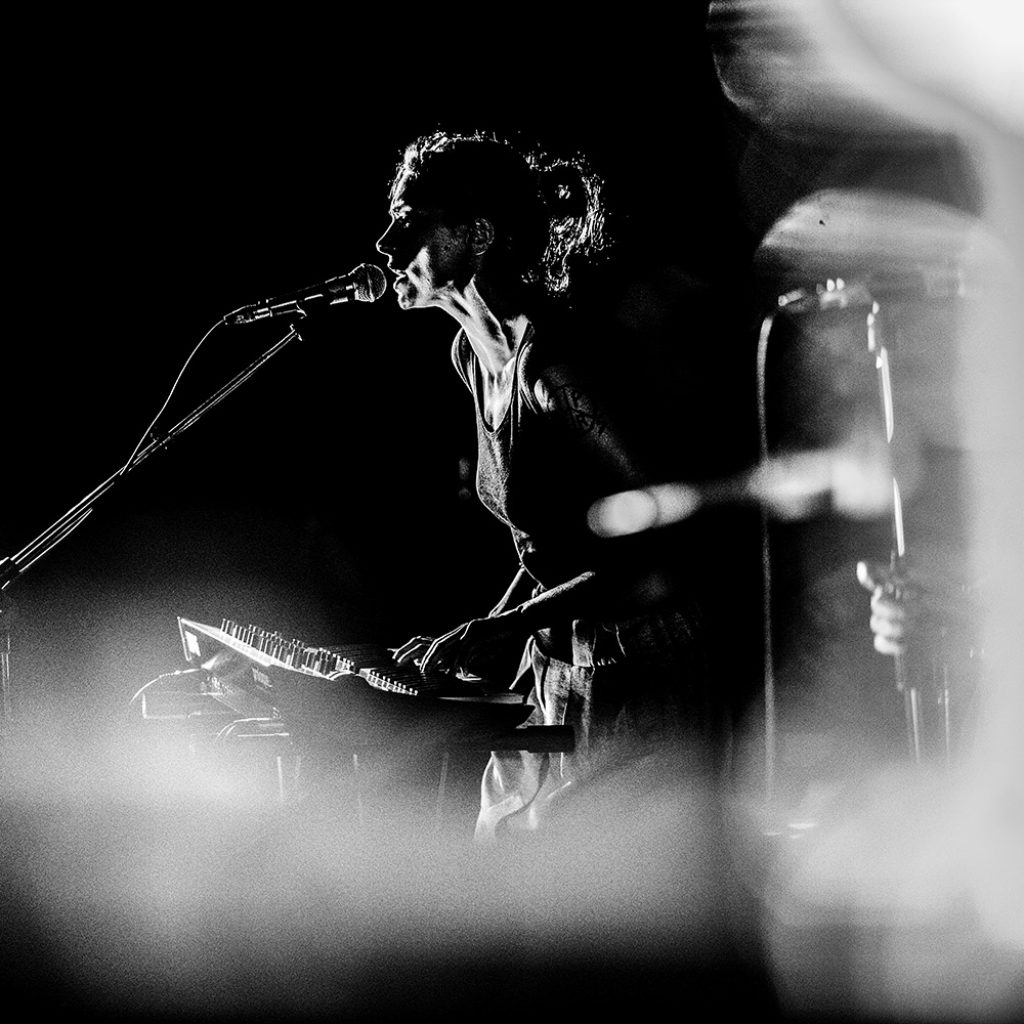HEKÁTĒ (EN)

Just for the record, who is in the band right now?
Iris, synth. Chara, bass. Vicky, drums. Lydia, vocals.
When did you start playing? How and where did you all meet?
We started playing in the spring of 2018, but we already knew each other from the local punk scene ─attending shows, helping book shows or playing in bands. Lydia moved away for a few years, but when she returned in 2017, Vicky said she was dying to start a band. It was time! So all four of us came together and formed Hekátē. Iris had been playing synths with The Cyclothymics, and Vicky was learning drums at that time. Chara had some experience with guitar, so she switched to bass and Lydia decided to sing. And the rest, as they say, is herstory.
What are your main influences? Which were your fave bands when you were all teenagers?
LYDIA: Hmmm, that’s a tough question. I have loved music since I can remember and I’ve been obsessed with all kinds of music. I used to listen to a lot of ’60s rock’n’roll (like The Kinks, 13th Floor Elevators, The Yardbirds, The Seeds, etc.) and just classic household names (like Sonic Youth, Velvet Underground, Blondie, Johnny Cash, etc.). It was only a matter of time until I discovered Punk, and then ’80s Greek punk, like Genia Tou Chaous, Hibernation, ANTI…, Metro Decay and more. The first time I heard «Ever Fallen in Love» by the Buzzcocks I felt like I had been hit by an electric shock! And listening to «Demystification» by The Zounds and «Rebellious Jukebox» by The Fall in a rock club called Corto Maltese, that was like a revelation! As a teenager I would listen to literally as much music as I could get my hands on from every genre and would go to rock clubs like Horostasio, Decadance, Closer etc. in downtown Athens to hear new music and dance until morning.
CHARA: I remember myself as a teenager being obsessed with Placebo, Smashing Pumpkins and Suede! Then I started going out in Exarcheia, to a club called Decadence (sadly it’s closed now). That’s where I first listened to Siouxsie and the Banshees, the Sisters of Mercy and many more goth legends. That’s where I got hooked on goth/post-punk/darkwave. Greece had an amazing post-punk/darkwave scene as well. Bands like Xoris Peridereo, Libido Blume, South of No North, ANTI… and many more have been some of my personal influences as a bass player.

What are your lyrics about? What inspires them? How would you describe the Hellenic scene?
LYDIA: Well, the process of writing lyrics is actually pretty hard for me. I hate sounding cliché and I know I do sometimes! Plus I don’t actually know how to sing, so matching words to sounds is a long process for me… and I thank my bandmates for their patience! The lyrics are about things that affect us. Like social anxiety, systems of oppression, things that make us sad, like losing loved ones or our own minds, the everyday chaos of living in a big city, a need to try and empower ourselves as women and other people around us, and reminding ourselves and them that things can get better if we work together.
The Greek scene is… improving. We had an amazing punk and hardcore scene back in the ’80s, then a revival in the ’00s. In general, I would say that today it has become more diverse and there are more styles crossing over with each other. There are more people from smaller parts of Greece that are exploring new sounds and using whatever instruments and skills they have to make interesting music, if not necessarily punk. There are more women and queer people (finally!), and the punk scene is finally recognizing that there are also non-cis males in the scene doing creative things. And women, femmes and queers are claiming more space, setting up their own shows, supporting each other’s efforts and doing their own thing. This is great!
Any plans of touring or releasing something in the future?
We are working on some new tracks and hope to have enough to release a full-length record, maybe in 2024? We also have a new track coming out on a wicked new compilation featuring new Greek bands. It will be released by Eisodos Kindynou Records from Athens, which is run by our awesome synth player Iris and her partner. They are both music encyclopedias and have great taste in music and have always helped support local bands.
As for touring… We hope to arrange a European tour, maybe in 2024. Until then, we hope to play a couple shows, in Athens and perhaps even in Iceland.
Is there any label releasing Hekátē?
Our first record was released on La Vida Es Un Mus, but we are not sure about who will release the second album. We would like to spread our wings and try something new. We have a great person who will master the new record, Stelios Efedakis, and look forward to working with him in the studio!

What do you think about feminism nowadays? Do you think it has a big impact on Greek society?
LYDIA: That is a question that I could talk about for days. I think feminism is massively important. I also think there is not only one feminism; nowadays we have feminisms (plural). And this helps us understand it in a contemporary context, as feminism has changed and evolved over the decades. Like all social movements, it has gone through the motions and in some cases even devolved or morphed into something rather problematic, like the fact that TERFs (trans-exclusionary radical feminists) have the audacity to call themselves feminists.
Feminism is about the liberation of all bodies, and this cannot be examined alone. Intersectional feminism reminds us that each person has various layers of oppression or privilege and we cannot look at how feminism can help us dismantle systems of oppression without looking at those systems, within us and outside of us. Not just patriarchy, but also capitalism, racism, ableism, sexism, colonialism and more.
Feminism has started to have an impact on the broader Greek society. Like many things, it arrived a bit late to Greece, but it is also suffering from pathologies of Greek society, which is deeply conservative and becoming even more so. So while it is spreading into mainstream society, media and thought, it is also being appropriated by state-controlled mass media and people who want to use it for their own manipulative purposes ─you know, like pink capitalism, rainbow capitalism, green-washing, populism. So it is going through various transformations, but I think the most important thing to remember is that feminism is about Theory and Praxis. So you have to read, read, read. And then act, act, act. So much of Greek political life is either too much talking about theory and a lot of inaction, or too fast to act without actually knowing why, or thinking about the impact. Having good intentions is great, like many of the younger people do today, who are way more aware of issues around gender and sex, but it is also important to read feminist theory in a historical context, and not just learn about it from social media. So I think it is important to combine both: the experience of older generations and the eagerness and energy of younger generations. And I think the same applies to feminism within a punk scene.
Right on! I’ve a last question for you. We heard that there is a big anarchist movement there in Greece, or at least here in Chile that’s what we think of when we hear about Greek punk, maybe because there’re many anarchist documentaries around… So we are curious about the movement there. Is it closely linked to the punk scene too? Do you consider Hekátē an anarchist band?
As for the anarchist and punk scene in Greece, there is a large anarchist movement within the local punk scene, but not all anarchists are punks. We as Hekátē are not an anarchist band per se, but we perform in DIY spaces, squats and benefit shows. A couple of our members have also been part of anarchist political groups and DIY spaces.








